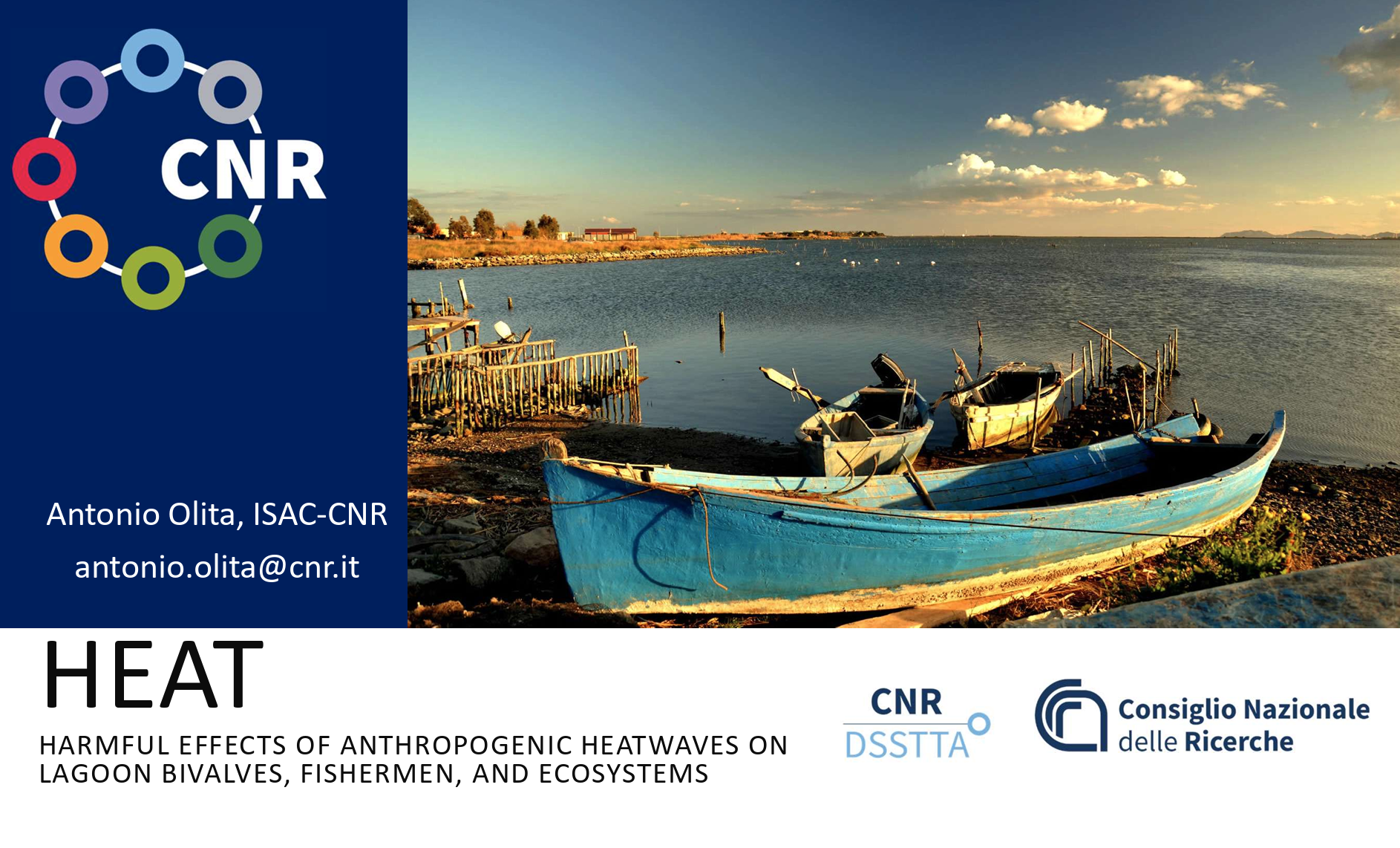
PI: ANTONIO OLITA (ISAC-CNR)
Co-PI: ANTONIO PUSCEDDU (UNICA)
“Heat Hits Lagoons, Shells and Humans”
Project Abstract
HEAT project (Harmful Effects of Anthropogenic HeaTwaves on lagoon bivalves, fishermen, and ecosystems) aims to deepen our comprehension of how MHWs, including the so-called sediment heatwaves (SHWs), could affect the temperature-related physiological traits (e.g. oxygen consumption) of two commercially relevant lagoon species: the native clams Ruditapes decussatus and the allochthonous Ruditapes philippinarum.
Additionally, recognizing the socio-economic importance of coastal lagoons, the project HEAT will also evaluate the impacts of MHWs on the fishing industry which relies on the species under investigation and on the livelihood of local communities Also, the direct impact of atmospheric heat waves (AHWs) and surface thermal anomalies on workers welfare will be investigated. The outcomes of the project HEAT are expected to foster the development of sustainable management strategies, at the same time enhancing the resilience of coastal lagoon ecosystems and their dependent human communities.
Team composition
The team is composed of researchers coming from 4 different CNR institutes (belonging to 3 CNR departments) jointly with the University of Cagliari. The area of expertise of the team is very wide, covering Climate to Meteorology to Marine science to Ecology to Biology to Economy and Social science.
Key members involved and full team list:
ISAC-CNR:
- Antonio Olita, AO, antonio.olita@cnr.it, is the PI of the proposal. He is a marine biologist with >20 years experience in Oceanography and Earth Observation.
- Leopoldo Fazioli, LF, leopoldo.fazioli@cnr.it, is a technologist with long lasting experience in ocean and meteo modelling.
- Valerio Lembo, VL, valerio.lembo@cnr.it, is a climate scientist with a background in analysis of climate models. Recent interests involve energy exchanges linked to heatwaves.
IAS-CNR:
- Paolo Magni, PM, paolo.magni@cnr.it, is director of research. His research mainly focuses on benthic ecology and the effect of anthropogenic pressures. He is the author of >80 scientific papers.
UNIVERSITY of CAGLIARI:
- Antonio Pusceddu, AP, apusceddu@unica.it, is ecologist and full professor at the University of Cagliari. He is Author of > 150 scientific papers. He is CoI of the proposal.
IRCRES-CNR:
- Elena Pagliarino, EP, elena.pagliarino@ircres.cnr.it, is an agricultural economist. Her research delves into the influence of sustainability on the organization of stakeholders across the agri-food chain.
- Monica Cariola, MC, monica.cariola@ircres.cnr.it, is an industrial economist with over 30 years of experience and skills in innovation economics, assessment of the economic-social impact of pollution.
- Greta Falavigna, GF, greta.falavigna@ircres.cnr.it, is an applied economist. Her research primarily focuses on employing econometric and artificial intelligence models in the context of numerous transdisciplinary R&D projects.
IBE-CNR:
Marco Morabito, MM, marco.morabito@ibe.cnr.it, is a researcher involved in several projects focusing on impacts of extreme temperatures on health, safety and productivity.
Work package structure
The Project is divided into 5 Work Packages, each containing different activities assigned to a single partner for responsibility. This division aims to establish an effective project structure and ensure smooth operation, while the project’s approach emphasizes interdisciplinary collaboration.
- WP1: Project Management and preparatory actions [M1-M24] (resp. ISAC, participants: all)
- WP2: Environmental and Climate characterization [M3-M21] (resp. UNICA (participants: ISAC, IAS)
- WP3: Mesocosm Experiments [6-18] (resp. UNICA, participant IAS)
- WP4: Socio-Economic Analysis [15-21] (resp. IRCRES, participant IBE)
- WP5: Transdisciplinary assessment of the impacts (15-22) (resp. ISAC; participants: ALL)
Project’s outputs
Comprehensive Data Sets: Description of sediment and water temperature heatwaves and their effects on invertebrate species. The project will generate extensive datasets from continuous monitoring and experimental studies, capturing key environmental parameters and biological responses.
Scientific Publications and Reports: Peer-reviewed articles and detailed project reports. Findings from the project will be synthesized into high-quality scientific papers and reports, contributing to the broader body of knowledge on marine ecology, environmental stressors, and socio-economic implications, prioritizing interdisciplinary publications.
Educational and Outreach Materials: Informative materials for public and stakeholders. The project will produce brochures, presentations, and online content to disseminate its findings and promote awareness of the lagoon’s ecological and socio-economic significance, the related risks, and the possible adaptive strategies.
Project impacts
Economic Resilience and Adaptation: Improved ability of local communities and industries to adapt to environmental changes. The socio-economic assessments and recommendations will help stakeholders develop strategies to cope with the impacts of sediment and heatwave stresses, fostering economic stability and resilience.
Informed Policy and Decision-Making: Contribution to informed policy development and decision-making processes.
Enhanced Scientific and Public Awareness: Increased awareness and understanding of the impacts of climate change and environmental stressors on marine ecosystems.

